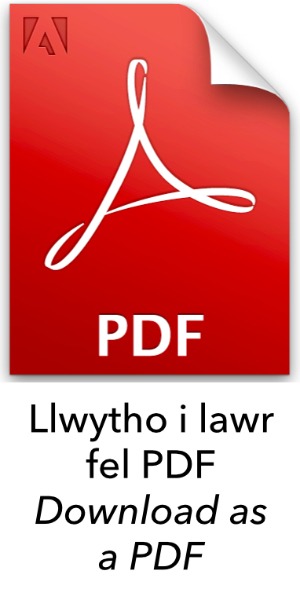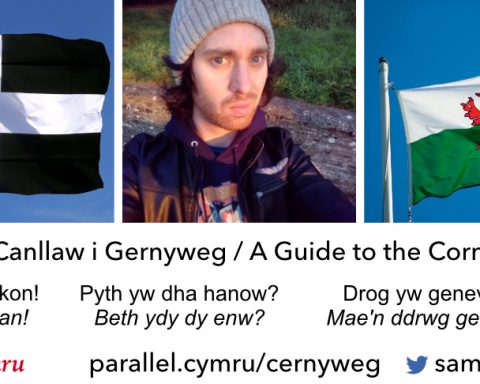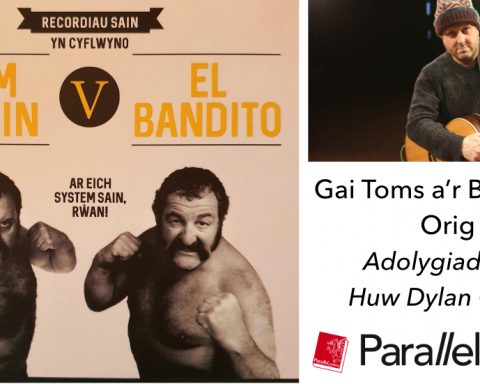Mae’r Cymro yw papur newydd Cymru fisol (£1 y pennod) sydd yn llawn dod o erthyglau a cholofnau am ddiwylliant a materion cyfoes Cymreig. I roi blas i ddarllenwyr Parallel.cymru, mae Gruffydd Meredith wedi ail-gyhoeddi eitem yma, gyda chyfieithiad Saesneg.
The Cymro is Wales’ monthly newspaper (£1 per issue) which is full of articles and columns about Welsh culture and current affairs. To give a taste to Parallel.cymru readers, Gruffydd Meredith has republished an item here, with an English translation.
| ’De ni gyd wedi clywed y trafod syrffedus am ddyfodol y Gymraeg. Oes, mae heriau yn wynebu’r Gymraeg, yn arbennig yr allfudo o Gymru, y mewnlifiad direolaeth o weddill Prydain a thu hwnt, a pholisi Llywodraeth Cymru i adeiladau degau o filoedd o dai dros Gymru nad sydd yn rhoi unrhyw flaenoriaeth i bobol Cymru - yn sicr rhywbeth pendant sydd angen ei herio drwy gyfraith a’i wrthdroi. Ond y gwir syml yw, er gwaethaf yr holl ymosod- iadau, y drwgdybio, y darogan a’r traethu academaidd, mae’r iaith Gymraeg mewn sefyllfa anhygoel o gryf o ystyried popeth. | We have all heard the tedious discussion about the future of Welsh. Yes, there are challenges facing the Welsh language, in particular the migration out of Wales, the uncontrolled influx from the rest of Britain and beyond, the Welsh Government’s policy of building tens of thousands of houses across Wales without giving any priority to Welsh people – certainly something that needs challenging in law and overturning. But the simple truth is that despite all the onslaughts, the distrust, the predictions and the academic pronouncement, the Welsh language is, all things considered, in an incredibly strong position. |
| Nid hynny’n unig chwaith, ond mae’n tyfu, nid yn unig yng Nghymru ond drwy weddill Prydain, ble bu’n iaith frodorol gynt. Wrth gwrs mae’r rhan fwyaf o’r diolch yma i’r Cymry Cymraeg eu hunain ac i athrawon. A rwan, drwy’r we yn enwedig, gwelir diddordeb cynyddol yn yr iaith gan ddysgwyr ym Mhrydain, Ewrop a gweddill y byd. | And not only that, but it is growing, not only in Wales but throughout the rest of Britain, where it was formerly a native language. Of course, most of the thanks for this must go to the Welsh-speaking Welsh themselves and the teachers. And now, especially though the Web, one can see an increasing interest in the language among learners in Britain, Europe and the rest of the world. |
| Ac nid diddordeb yn yr iaith yn unig sydd, ond hefyd yn hanes anhygoel Cymru a’r Prydeinwyr/Brythoniaid cynnar. Ac wrth i’r Saesneg droi yn iaith robotaidd, iwnifform, unffurf a llwydaidd y globaleiddwyr sydd am weld byd heb ffiniau nac amrywiaeth, mae pobol gwledydd Prydain yn arbennig fel ’taent yn awchu am rywbeth sy’n golygu rhywbeth go iawn iddynt yng nghyswllt eu gwlad a hanes anhygoel yr ynys mae’r gwledydd yn bodoli ynddi. Efallai bod llwyddiant ysgubol y gyfres anhygoel Game of Thrones yn destament i hynny - mae’n amlwg fod llawer iawn os nad y rhan fwyaf o ysbrydoliaeth y gyfres yma wedi dod o hynt a helynt y Brythoniaid/Celtiaid. | And not just interest in the language, but also in the remarkable history of Wales and the early Britons. And as English turns into a robotic, uniform, colourless language of globalizers who want to see a world without borders and without variety, the people of the countries of Britain in particular are as it were itching for something which means something real to them in connection with their country and the remarkable history of the island within which their countries exist. Perhaps the sweeping success of the remarkable Game of Thrones series is a testament to this – it is obvious that much if not the greater part of the inspiration for this series has drawn on the fortunes of the Britons/Celts. |
| Ac efallai bod elfen ysbrydol ddyfnach i hyn i gyd. Efallai, jisd efallai, bod pobol yn teimlo ym mêr eu hesgyrn fod gan ysbrydiaeth a’r Gymraeg gysylltiadau mwy nag yr ydym yn ei sylweddoli. Beth bynnag, dyma resymau i ni ddathlu ein hiaith anhygoel a pham fod popeth i’w ennill: | And perhaps there is a deeper spiritual element in all this. Perhaps, just perhaps, people feel in the marrow of their bones that there are more connections than we realise between spirituality and the Welsh language. Anyway, here are reasons for us to celebrate our wonderful language and why there is everything to be gained: |
| Cyn 1999, roedd mewnlifiad net i Brydain yn amrywio o rhwng 0 i 50,00 y flwyddyn. Ond o 1999 ymlaen, yn dilyn polisi llywodraeth Llafur o dan Tony Blair i agor y llifddorau, bron, mae’r ffigwr yma wedi bod yn agosach i 300,000 net y flwyddyn - ffigwr abswrd o uchel sydd yn cyfateb â dinas newydd maint Coventry bob blwyddyn. Ond er gwaethaf hyn i gyd, mae’r Gymraeg yn dal i fod yn ail o ran niferoedd siaradwyr ym Mhrydain. | Before 1999, annual net migration into Britain varied from between 0 to 50,000. But from 1999 on, following the policy of the Labour government under Tony Blair in opening the floodgates, almost, this net annual figure has been closer to 300,000 – an absurdly high figure which corresponds to a new city the size of Coventry every year. But despite all this, the Welsh language continues to hold second place in terms of number of speakers in Britain. |
| Er ei fod dipyn o sbel yn ôl erbyn hyn dwi’m yn deud, yn ôl cyfrifiad 2011 mae 712,000 o siarad-wyr brodorol Cymraeg ym Mhrydain (562,000 yng Nghymru a hyd at 150,000 yn Lloegr, yr Alban a Gogledd Iwerddon). Mae hyn yn golygu bod mwy yn ei siarad na Phwyleg (546,000), Punjabi (273,000), Urdu (269,000), Bengali (221,000), Arabeg (159,000) a Tsieinëeg (141,000) - ac mae’n ail i’r Saesneg yn unig. Gellir amcangyfrif hefyd bod o leiaf 20,000 o siarad-wyr (a chymdeithasau o wahanol feintiau) Cymraeg rhugl ar draws gweddill y byd, ar gyfandir Ewrop, yr Unol Daleithiau, Canada, Awstralia, a’r Ariannin yn arbennig, sydd yn gwneud y cyfanswm o siaradwyr Cymraeg swyddogol yn 732,000 o leiaf. | Although it is a little after what I am talking about, according to the 2011 census there are 712,000 native Welsh speakers in Britain (562,000 in Wales and up to 150,000 in England, Scotland and Northern Ireland. This means that more people speak it than Polish (546,000), Punjabi (273,000), Urdu (269,000), Bengali (221,000), Arabic (159,000) and Chinese (141,000) – and it is second only to English. In addition to the millions of Welsh people scattered around the world in general it is estimated that there at least specifically 20,000+ fluent Welsh speakers (and societies of various sizes) across the rest of the world, on the continent of Europe, in the United States, Canada, Australia and in particular in Argentina, which makes the total number of official Welsh speakers at least 732,000. |
| Gellir tybio mai 800,062 yw’r ffigwr cywir fodd bynnag oherwydd yn ôl yr ONS, 630,062 (ac nid 562,000) yw’r nifer o bobol yng Nghymru sydd â’r gallu un ai i sgwennu, siarad neu ddeall Cymraeg, sydd yn awgrymu nad yw nifer helaeth o bobol yn nodi eu bod yn siaradwyr Cymraeg ‘go iawn’ gan nad ydyn nhw o bosib yn ddigon hyderus neu yn poeni nad yw eu Cymraeg yn ddigon da neu yn ramadegol gywir ayb. | However, it can be supposed that the true figure is 800,062, because according to the ONS, 630,062 (and not 562,000) is the number of people in Wales who can either write, speak or understand Welsh, which suggests that there are a considerable number of Welsh speakers who do not designate themselves ‘proper’ Welsh speakers because they are possibly not confident enough or worry that their Welsh is not good enough or grammatically correct etc. |
| Heb anghofio wrth gwrs fod yna 6,296,702 miliwn o bobol sydd yn cyfri eu hunain yn Gymry yn y byd yn gyffredinol, yn cynnwys 1,980,323 miliwn yn yr Unol Daleithiau (0.6 % o’r boblogaeth), 609,711 yn Lloegr, 474,805 yng Nghanada,125,597 yn Awstralia a 50,000 yn yr Ariannin - i enwi dim ond ambell i wlad amlwg. Ac yn ôl adroddiad a wnaethpwyd gan Gynulliad Cymru mae gan 16.3 miliwn o bobol yn y byd enwau teuluol Cymreig- yr hyn a elwir yn diaspora Cymreig. | Not forgetting of course that, as mentioned, 6,296,702 people identify themselves as Welsh in the world as a whole, including 1,980,323 in the United States (0.6 of the population), 609,711 in England, 474,805 in Canada, 125,597 in Australia and 50,000 in Argentina – to name but some of the obvious countries. And , according to a report made by the Welsh Assembly, 16.3 million people in the world have Welsh family names – what is called the Welsh diaspora. |
| Ond mae mwy! Yn 2018 cyhoeddodd y rhaglen dysgu ar-lein/ar ffôn, Duolingo, fod mwy na miliwn o bobol rwan yn dysgu Cymraeg drwy ei meddalwedd - bron i ddwbl y nifer oedd yn gallu siarad Cymraeg yn ôl Cyfrifiad 2011. Mae’r Gymraeg yn fwy poblogaidd ar Duolingo na Hwngareg a Rwmaneg - dwy iaith â llawer iawn mwy o siaradwyr brodorol. Yn dechnegol mae hyn yn golygu fod o leiaf 1.8 miliwn o siaradwyr Cymraeg yn y byd erbyn hyn. Anghofiwch sloganu pitw, tocenistaidd a diystyr llywodraeth Cymru am gael miliwn o siaradwyr Cymraeg erbyn 2050. Mae bron i ddwy filiwn yn ei siarad yn barod! | But there is more. In 2018 the online/smartphone learning program Duolingo announced that more than a million people are now learning Welsh by means of its software – almost double the number that could speak Welsh according to the 2011 Census. Welsh is more popular on Duolingo that Hungarian and Rumanian – two languages with very many more native speakers. Technically this means that there are now at least 1.8 million Welsh speakers in the world. Forget the Welsh government’s feeble, tokenistic and meaningless slogan about getting a million Welsh speakers by 2050. Almost two million speak it already! |
| Mae’r ffigyrau yma a’r ffaith fod y Gymraeg yn dal yn un o brif ieithoedd modern Prydain yn destament anhygoel i ddygnwch y Gymraeg yng Nghymru, Prydain a’r byd. A gan mai’r Gymraeg/Brythoneg yw iaith frodorol Prydain a bod mwy a mwy o bobol yn dod i ddeall hyn, mae’n teimlo fel yr amser iawn i gynnig i ysgolion ac awdurdodau addysg Lloegr a’r Alban y syniad eu bod yn dysgu Cymraeg fel ail iaith. | These figures and the fact that Welsh continues to be one of the chief languages of modern Britain are an amazing testament to the persistence of Welsh in Wales, Britain and the world. And since Welsh/Brythonic is the native language of Britain and more and more people are coming to understand it, one feels that it is the right time to approach schools and educational authorities in England and Scotland with the idea of that they should teach Welsh as a second language. |
| Ac oherwydd cefndir yr iaith a’r ffaith ei bod yn dal i fod yr ail iaith fwyaf poblogaidd ym Mhrydain, mae’n anodd gweld sut y gallai swyddogion addysg Lloegr a’r Alban wrthod ystyried y syniad. Os ydi Punjabi, Bengali, Urdu, Almaeneg, Ffrangeg, Sbaeneg a Phwyleg yn cael eu dysgu drwy Brydain pam ddim y Gymraeg hefyd? Os mai penderfyniad i adran addysg ganolog Lloegr a’r Alban fyse hyn, yne gellid eu targedu a dwyn pwy-sau arnyn nhw yn ogystal â’r awdurdodau lleol. Joben fach i Ddyfodol i'r Iaith a Chymdeithas yr Iaith efallai? | And given the background of the language and the fact that it continues to be the second most popular language in Britain, it is hard to see how the educational officials could refuse to consider the idea. If Punjabi, Bengali, Urdu, German, French, Spanish and Polish are taught throughout Britain, why not Welsh? If this is a decision for the central educational department in England and Scotland, then they could be targeted and weight brought to bear on them as well as on local authorities. A little job for the campaign groups Dyfodol i'r Iaith (Future of the Language) and Cymdeithas yr Iaith (the Welsh Language Society), perhaps? |
| Efallai y bydde hefyd modd cyfuno’r gwersi Cymraeg gyda dysgu hanes go iawn Brythoneg/Celtaidd Prydain, ac olrhain gwreiddiau’r Cymry i hanes Ewrop, ac ymhellach na hynny hefyd. | Perhaps there would also be a way of linking Welsh lessons with teaching the proper history of Brythonic/Celtic Britain, and tracing the origins of Wales in the history of Europe, and beyond that too. |
| Felly, ie, Brythoneg/Cymraeg cynnar yw iaith frodorol Prydain, gan gynnwys Lloegr, yr Alban a Chernyw, gydag agweddau ohoni yn dal ar gof a chadw mewn ardaloedd o Loegr - Cumbria, gogledd Lloegr a’r gororau yn arbennig - hyd heddiw. Dydi hyn ddim yn syndod mawr gan fod Rheged (ardal Cum-bria fodern), Elfed (ardal Leeds fodern) a Gododdin (ardal Caeredin fodern) yn rhan o hen ogledd y Cymry nes y seithfed ganrif, ac Ystrad Clud (Strathclyde) yn yr Alban am ganrifoedd wedi hynny. Byddai’n ddiddorol iawn gweld be fydde’r ymateb yn y gwahanol ardaloedd yma i gyflwyno’r Gymraeg fel opsiwn ar y cwricwlwm addysg. | So, yes, early Brythonic/Welsh is the native language of Britain, including England, Scotland and Cornwall, with features of it still remembered even today and preserved in areas of England – Cumbria, the north of England and the Welsh Borders in particular. This is not surprising given that Rheged (in the region of modern Cumbria), Elfed (in the region of modern Leeds) and Gododdin (in the region of modern Edinburgh) were part of the Old North of Wales until the seventh century, and Ystrad Clud (Strathclyde) in Scotland for centuries after that. It would be very interesting to see what would be the response of these different regions to introducing Welsh as an option on the learning curriculum. |
| A pham ddim Cernyw hefyd felly? Onid oes modd ail gyflwyno’r Gymraeg i Gernyw gan mai’r un iaith â’r Gernyweg ydi hi yn y bôn? Mi oedd teyrnas wreiddiol Cernyw, ac wedi hynny teyrnas llawer mwy Dyfneint (Dumnonia yn y Lladin), yn Gymraeg/Frythoneg ei hiaith nes y nawfed ganrif o leiaf, ac mi’r oedd teyrnas Dyfneint yn cynnwys y siroedd modern presennol Cernyw, Devon (Dyfnaint yn y Gymraeg erbyn heddiw), Dorset, ynysoedd Scilly a rhan helaeth o Wlad yr Haf/Somerset. Onid oes cyfle i ddefnyddio holl brofiad y frwydr iaith a’r deddfu yng Nghymru er mwyn ail-gyflwyno’r Gymraeg i Gernyw a dod o hyd i ffordd o blethu’r Gymraeg a Chernyweg i’w gilydd, fel yr oeddynt yn arfer bod? Neu o leiaf gyflwyno’r opsiwn i genedl -detholwyr Cernywaidd ei ystyried, hyd yn oed petai ond fel opsiwn i fynd law yn llaw gyda’r Gernyweg bresennol? | And why not Cornwall too then? Is there not a way of reintroducing Welsh into Cornwall given that it is fundamentally the same language as Cornish. The original realm of Cornwall, and after that the much larger Dyfneint (Dumnonia in Latin) was Welsh/Brythonic speaking until at least the ninth century, and the realm of Dyfnaint included the modern present-day counties of Cornwall, Devon (today Dyfnaint in Welsh), Dorset, the Isles of Scilly and a large part of Somerset. Is there not an opportunity to use the whole experience of the language wars and the legislation in Wales to reintroduce Welsh into Cornwall and find a way of weaving Welsh and Cornish together, as used to be the case? Or at least to give the Cornish people and electorate the option to consider it, even if this was only as an option alongside present-day Cornish? |
| Dwi’n credu mai’r teimlad yn gyffredinol, er gwaethaf pob ymdrech gan y wasg a’r darlledwyr Llundeinig fel arall, yw bod gwir ewyllys da a diddordeb diwylliannol yn bodoli tuag at y Gymraeg yn Lloegr a thu hwnt erbyn hyn. Mae hwn yn ewyllys da sydd hefyd o bosib yn ymestyn i holl amrywiaeth ieithyddol brodorol Prydain megis Gaeleg yr Alban, Scots, Cernyweg, Gwyddeleg ac Ulster Scots yng ngogledd Iwerddon, yn ogystal â Saesneg yn gyffredinol, gael eu hastudio a’u gwerthfawrogi yn gyffredinol. | I believe that despite every effort by the Press and London-based broadcasters, there exists a general feeling of real goodwill towards the Welsh language and a cultural interest in it in England and beyond. This is a goodwill that possibly extends also to the whole variety of Britain’s other more recently native languages, such as Gaelic and Scots in Scotland, Cornish, and Irish and Ulster Scots in Northern Ireland, as well as English. |
| Mae’r we yn galluogi i’r Gymraeg anadlu ac ymestyn ei hadenydd yn fwy nag erioed. Gwelir negeseuon Cymraeg a Chymreig ar y cyfryngau cymdeithasol gan bobol â miliynau o ddilynwyr ar draws y byd, sy’n codi ymwybyddiaeth o Gymru yn fwy nag erioed o’r blaen o bosib. | It is the web that enables Welsh to breathe and spread its wings more than ever before. Messages in the Welsh language can be seen on social media with millions of followers across the world, which raises awareness of Wales to more of a degree than has ever been possible before. |
| A dwi ddim yn meddwl fod rhaid i’r Gymraeg gydymffurfio yn ddigwestiwn gyda phob technoleg chwaith, megis y peiriannau gwran-do Orwelaidd Alexa, Siri, Apple HomePod nac unrhyw fersiwn Gymraeg o’r rhain. Fel mae’r nofel Y Dydd Olaf; ar gael i lawrlywtho am ddim gan Owain Owain yn ei amlygu, dwi’n credu mai un o gryfderau ac apêl y Gymraeg i lawer ydi ei bod yn gallu bod yn iaith lled gudd ac yn alternatif gwrthwynebus neu rebelaidd i gwlt crefyddol ac allan o reolaeth technoleg di-gwestiwn a’r cwmnïau technolegol rhyngwladol hynny sydd yn ceisio ei wthio ar bawb fel ei meistr newydd. | And I do not think either that there is any compulsion on Welsh to transform itself unquestioningly to suit every technology, such as the Orwellian listening devices Alexa, Siri, Apple HomePod or any Welsh version of these. As Owain Owain’s novel Y Dydd Olaf (The Last Day; available to download for free) demonstrates, I believe that one of the strengths and appeals of Welsh to many is that it can be a somewhat secret language and an oppositional or rebellious alternative to the new cult of technology and the unquestionably out of control international technology companies - companies which are trying to impose their new technological enslavement on everyone as if it's a new religion. |
| Mae’r Gymraeg yn cael ei gweld a’i chlywed ar y cyfryngau yn gyffredinol yn fwy nag erioed - yn cael ei ddefnyddio gan sêr teledu a gan ffilmiau Hollywood, sêr chwaraeon rhyngwladol a hyd yn oed gan brif weinidogion y deyrnas Gyfunol - hyd yn oed os mai dim ond dau air oedd ganddi i ymateb i heclwr: “Wel, pnawn da...!!” | The Welsh language can be seen and listened to on the media in general more than ever before – it gets used by television stars and by (angen tynnu allan 'stars' a 'by') Hollywood film stars, by international sports stars and even by Prime Ministers of the United Kingdom - the by now ex Prime Minister Theresa May in this case, even if it was a case of only a couple of words to answer a heckler: "Wel, pnawn da...!!" (a sardonic “Well, good afternoon…!!’) |
| Ac fel mae llawer wedi clywed, yn 2018 cafodd y band Cymraeg Alffa lwyddiant anhygoel a chreu hanes drwy fod y grŵp Cymraeg cyntaf erioed i gael miliwn o wrandawiadau o’u cân Gymraeg ‘Gwenwyn’ ar y platfform cerddoriaeth ar-lein Spotify - cân sydd bellach wedi cael dros 2.8 miliwn o wrandawiadau ac sydd, ar y raddfa yma, ar ei ffordd i barhau i hitio’r miliynau. | And as many will have heard, in 2018 the Welsh band Alffa had amazing success and created history by being the first Welsh group ever to get a million plays of their Welsh song ‘Gwenwyn’ on the online music platform Spotify – a song which has now had over 2.8 million plays and which, at this rate, is on its way to go on to reach millions. |
| Yn ddiweddar, canodd Côr Penrhyn yn Gymraeg ar albym Damon Albarn gyda’i grŵp The Good the Bad and the Queen. Mae hyn yn ddatblygiad diddorol gan fod Albarn wedi treulio’r ddegawd ddiwethaf a mwy yn arbrofi gyda ‘cherddoriaeth byd’ yn rhyngwladol ond nid yr iaith a’r diwylliant cyfoethog sy’n bodoli ond ryw dair awr mewn car o’i gartre yn Llundain. | Lately, Penrhyn Choir sang in Welsh on a Damon Albarn album with his group The Good the Bad and the Queen. This is an interesting development because Albarn has spent the last decade and more experimenting with ‘world music’ internationally but not with the language and rich culture that exists only two hours away by car from his home in London. |
| Y pwynt efallai yw hyn - nid gwlad fach ddiddim heb allu na grym yw Cymru, ei phobol na’i hiaith. Ond gwlad a phobol sydd yn gallu herio a gwrthdroi pob ymgais i’w gwasgu allan o fodolaeth. | Perhaps the point is this - Wales is not a small insignificant country without ability or power, nor are its people and its language. But rather, a country and people which can challenge and resist every attempt to crush them out of existence. |
| Ac o ran yr iaith, nid iaith fach leiafrifol, anghenus i’w phitio na’i lapio mewn gwlân cotwm fu hi erioed, ond iaith sydd wastad wedi gallu cynnig rhywbeth gwahanol i’r byd ac i ymgais y globaleliddwyr i gael byd unffurf, uniaith. Does ryfedd fod prif gyfryngau corfforaethol Lloegr a thu hwnt yn mynnu dirmygu a cheisio tanseilio’r Gymraeg ers canrifoedd. Mae’r Gymraeg yn symbylu bygythiad tawel ond pendant i’w hymdrech, mae’n ymddangos, i gael Saesneg fel prif iaith y byd - bygythiad sydd nid yn unig yn cynrychioli diwylliant a gwir hanes ynys Prydain ei hun ond sydd efallai yn fygythiad mwy pwerus - bygythiad sydd yn awgrymu rhywbeth ysbrydol ac annelwig sydd yn cysylltu pobol gyda rhywbeth tu hwnt i gyfathrebu bob dydd. | And as far as the language goes, it was never a small impoverished minority language to be pitied and wrapped in cotton wool, but a language which has always been able to offer something different to the world and to counter the attempt of the globalizers to create a uniform, monoglot world. It is no wonder that the main corporate media of England and beyond have for centuries insisted on treating the Welsh language with contempt and trying to undermine it. The Welsh language represents a quiet but definite threat to their apparent efforts to establish English as the world’s main language – a threat which not only represents a crucial culture and history of the island of Britain, but is perhaps even more significant than that – a threat which suggests there is something spiritual and invisible connecting people with something beyond everyday communication. |
| Iaith y nefoedd? Posib iawn. | The language of heaven? Very possibly. |
ycymro.cymru / Y_Cymro
Yn ychwanegol, mae Gruffydd yn cyhoeddi eitemau Saesneg ar The Sovereigner.
In addition, Gruffydd publishes English items on The Sovereigner.








